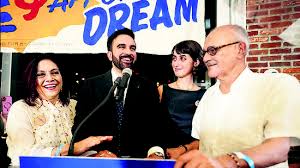Zohran Mamdani a step closer to being NYC’s 1st South Asian mayor

In a remarkable political turn, Zohran Mamdani has emerged as the leading contender in New York City’s 2025 mayoral race, bringing him one major step closer to making history as the city’s first South Asian and first Muslim mayor. At just 33, Mamdani’s rise is shaking up the status quo, signaling a generational and ideological shift that could redefine the city’s political identity.
A Groundbreaking Primary Victory
Mamdani recently secured a significant lead in the Democratic primary, which used a ranked-choice voting system. In the first round of vote counting, Mamdani garnered 43.5% of first-choice ballots, ahead of former Governor Andrew Cuomo’s 36.4% and NYC Comptroller Brad Lander’s 11.3%. Although the full results of the ranked-choice process will be finalized shortly, Cuomo has already conceded defeat and personally congratulated Mamdani on his success.
This primary win is a landmark moment not only for Mamdani’s political career but also for New York’s vast and diverse South Asian community, many of whom see his rise as a symbol of long-overdue representation in the city’s highest office.
Who Is Zohran Mamdani?
Born in Kampala, Uganda, to Indian parents, Mamdani moved to New York as a child and later attended Bowdoin College. His mother, filmmaker Mira Nair, is a prominent figure in global cinema, and his father, Mahmood Mamdani, is a respected academic. Zohran, however, has carved out his own path—one rooted in activism, community organizing, and a vision of democratic socialism.
He first gained public attention after defeating a long-serving incumbent in the New York State Assembly in 2020. Representing Queens, Mamdani quickly became known for his unapologetically progressive platform and his ability to connect with working-class communities across ethnic and religious lines.
A Progressive Agenda for New York City
Mamdani’s campaign is powered by a bold and expansive vision for the city. His core promises include:
- Free public buses for all New Yorkers
- A citywide rent freeze to combat unaffordable housing
- Universal childcare to support working families
- City-run grocery stores to end food deserts
- A wealth tax on the city’s ultra-rich to fund public programs
Such proposals have electrified the city’s progressive base, particularly young voters, tenants, and low-income communities. Mamdani has positioned himself not just as a reformer, but as a radical reimagination of what governance can look like in America’s largest city.
Endorsements from Progressive Heavyweights
Mamdani’s campaign has received endorsements from several national progressive icons. Senator Bernie Sanders called him “the best choice for mayor,” while Congresswoman Alexandria Ocasio-Cortez highlighted his record of standing with working-class New Yorkers. Their support has helped broaden Mamdani’s appeal and bring his campaign into the national spotlight.
Social media has played a pivotal role in boosting Mamdani’s candidacy. Viral videos of his campaign speeches, grassroots organizing, and community-led events have attracted widespread attention. His supporters include a mix of college students, union members, artists, and activists—many of whom see him as a candidate who truly reflects their struggles and aspirations.
The Road Ahead: General Election in November
Though Mamdani has secured the Democratic nomination, the race is far from over. He will face several challengers in the November general election, including:
- Eric Adams, the current mayor, now running as an independent
- Curtis Sliwa, the Republican candidate and former radio host
- Potentially even Andrew Cuomo, who may still appear on the ballot via an independent or third-party line
However, in a city where registered Democrats outnumber Republicans by nearly 7 to 1, Mamdani’s path to victory appears strong—particularly if he can maintain support from working-class and immigrant communities, alongside younger, urban voters.
Representation That Resonates
Mamdani’s candidacy carries powerful symbolism. If elected, he would be the first Muslim and first South Asian to serve as mayor of New York City—a role historically dominated by white men. His rise comes amid a broader push for more inclusive leadership across the U.S., where communities of color continue to seek meaningful political representation.
Beyond identity, Mamdani has centered his campaign around values that transcend race and religion: equity, justice, and access. “This is a city that belongs to all of us,” he said at a recent rally in Jackson Heights. “We cannot let billionaires and landlords dictate our future.”
Critics and Challenges
Not everyone is aligned with Mamdani’s radical platform. Critics argue that his proposals are too ambitious or unrealistic, especially in a city already grappling with budget constraints and public safety concerns. Others warn that his wealth tax plans could alienate business leaders and drive high-income earners out of the city.
Yet Mamdani remains undeterred. His message has been clear: “We can no longer afford politics as usual. New York needs courage, not compromise.”
A New Chapter for NYC Politics?
Whether or not Mamdani ultimately wins in November, his primary victory is already being seen as a watershed moment. It represents the growing strength of New York’s progressive movement and the political awakening of communities that have long been on the margins of power.
If elected, Zohran Mamdani could usher in a new chapter in NYC’s history—one where the city’s leadership reflects its diversity and dares to imagine a more equitable future.






